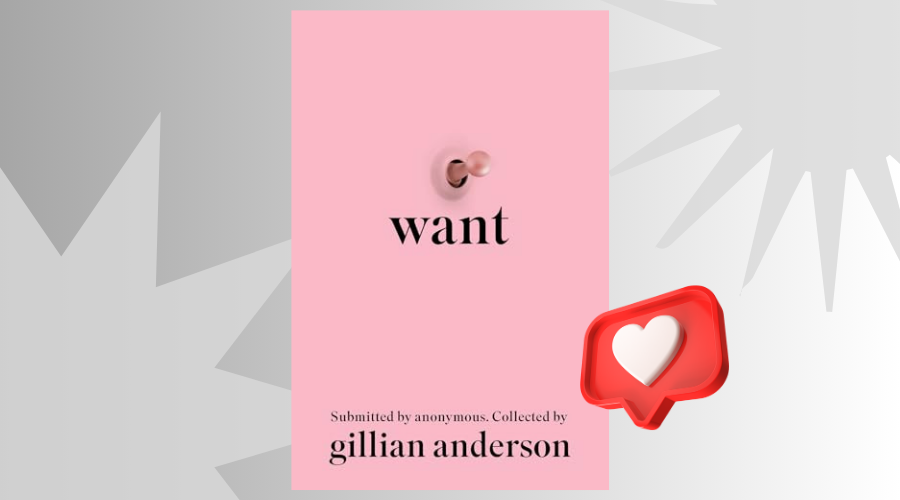In September 2024, Gillian Anderson, the celebrated actress known for her roles in The X-Files and Sex Education, released a bold new book titled Want: Sexual Fantasies by Anonymous. This anthology dives deep into the private desires and fantasies of women from around the world, offering an unflinching exploration of what they crave when freed from the burden of societal judgment.

| ✍️Author | Gillian Anderson (editor) |
| 📅Publication date | September 17, 2024 |
| ⭐Goodreads Rating | 3.83 |
| ✔️ISBN-10 | 1419777297 |
| 📆 Pages | 400 |
| ❔Topics | Nonfiction, Feminism, Essays, Short Stories, Sexuality, Adult, Womens, Psychology, Self Help |
Synopsis of “Want: Sexual Fantasies by Anonymous”
Want: Sexual Fantasies by Anonymous, edited by Gillian Anderson, is a bold and deeply intimate exploration of women’s inner sexual worlds. This book features over 1,800 anonymous letters from women across the globe, sharing their most private fantasies. It seeks to illuminate the complexity and diversity of female desire, breaking down taboos and fostering an open dialogue about sexuality.
The anthology delves into fantasies ranging from romantic and tender to daring and unconventional, revealing not just physical desires but emotional and psychological yearnings. These anonymous confessions represent women from all walks of life, offering a raw and unfiltered look at the breadth of human sexuality.
Anderson, inspired by the groundbreaking 1973 book My Secret Garden by Nancy Friday, provides a modern lens to female fantasies in a world that has seen both progress and lingering stigmas around discussing sexuality openly. Through this collection, she encourages readers to embrace their fantasies without shame, promoting self-discovery and empowerment.
It’s a provocative and empowering read that challenges societal norms while celebrating the unique and personal nature of desire.
Gillian Anderson Quotes on the book
- What do you want, when no one is watching?
- What do you want, when the lights are off?
- What do you want, when you are anonymous?
These introspective questions from Gillian Anderson’s Want invite readers to confront their deepest desires, stripped of judgment, societal expectations, or the fear of being seen. They challenge us to consider what we truly yearn for when there’s complete freedom to express ourselves. These prompts set the tone for a profound exploration of anonymous fantasies, emphasizing vulnerability and the liberation found in sharing secrets.
- “There’s something about women being encouraged to start with the cloak of anonymity and the freedom of anonymity to be able to expose themselves, lay it all out there, celebrate, and say, ‘This is all of me.’ And in absorbing that from other women who get to sit with these stories, it’s become a cathartic feeling of identification and smashing through shame because they’re reading some of the things they themselves feel and think.”
- “I had expected that shame wouldn’t be so prevalent in our book. Because of the prevalence of sex around us everywhere and all the time—billboards and magazines and shows and podcasts and porn—I expected that we would have blasted through much of it.”
- “Depending on our history, shame can be ingrained in ourselves, in our DNA, in our genetics, I believe.”
- “Obviously, it’s amazing to be on the New York Times bestseller list and lists in the UK. But at the end of the day, the real celebration is hearing women talk about their experiences and how empowered it is making them feel, not just in themselves, but in having this conversation and in a public forum so that it can spread to as many women as possible—hopefully around the world.”
For more details and direct quotes, check the full interview here.
A New Chapter in Sexual Discourse
Inspired by the groundbreaking 1973 work My Secret Garden by Nancy Friday, Want aims to shed light on the hidden aspects of female sexuality. Anderson, in her introduction, reflects on how women’s fantasies have evolved over the past fifty years, particularly as conversations about sex and identity have become more open. The book collects anonymous submissions from women of all ages, identities, and experiences, creating a mosaic of voices that highlight everything from intimacy and fear to empowerment and pleasure.
How It All Began
The project started when Anderson issued an open call for anonymous submissions, encouraging women to share their fantasies without inhibition. The response was overwhelming—over 800,000 words worth of letters flooded in. From teenagers discovering their sexuality to post-menopausal women embracing newfound freedom, the stories encapsulate a wide range of experiences. Topics include gentle romance, kink, non-monogamy, and fantasies involving multiple partners, revealing the nuanced and diverse nature of female desire.
Themes and Critiques
The book explores fantasies not only as a source of pleasure but also as a way to discuss topics like consent, gender roles, and body image. Some letters reflect the frustrations of modern dating, while others embrace the joy of unconventional love lives. However, the project is not without criticism. Some reviewers have pointed out that by filtering out certain taboo fantasies, the book might present an overly sanitized version of women’s sexuality. Still, Anderson’s effort to create a safe, inclusive space for women to express their desires is widely praised as a step toward breaking down the shame often associated with female fantasies.
Themes Explored in Gillian Anderson’s Want
Gillian Anderson’s Want is more than just a collection of sexual fantasies—it’s a deep dive into the complexities of female sexuality. Here’s a breakdown of some of the major themes that emerge from the anonymous submissions and Anderson’s curation:
- Desire and Pleasure: Many entries focus on the joys of uninhibited pleasure, exploring fantasies where women indulge in their deepest desires without guilt or shame.
- Consent and Boundaries: Fantasies in the book often highlight the importance of consent. They touch on situations where boundaries are either respected or transgressed, opening a conversation about how consent plays a role even in imaginative scenarios.
- Romantic vs. Kinky Fantasies: The collection offers a spectrum, from sweet, romantic encounters to fantasies involving kink and BDSM. This diversity showcases how desire can range from tender to intense within the same person.
- Non-Monogamy and Group Scenarios: Several fantasies involve polyamory, open relationships, or group sex, reflecting the growing conversation around non-traditional relationship structures.
- Body Image and Self-Acceptance: Women also share fantasies that explore their relationship with their bodies, touching on themes of self-acceptance, body confidence, and the challenges of societal expectations around appearance.
- Motherhood and Sexuality: Some letters come from mothers grappling with how to reclaim their sexual selves while balancing the demands of parenting and long-term relationships.
- Aging and Post-Menopausal Desire: Older contributors share their experiences of sexual awakening later in life, challenging stereotypes that suggest sexuality fades with age.
- Sexual Orientation and Identity: The book amplifies voices from across the spectrum of sexual orientation, including queer, pansexual, and non-binary experiences, providing a space to explore how identity shapes desire.
- Shame and Liberation: Many fantasies are marked by a tension between shame and liberation. Anderson’s collection provides a platform for women to confront societal taboos and reclaim their desires as normal and healthy.
- Privacy and Anonymity: One recurring theme is the idea of anonymity as freedom. Women feel liberated to share fantasies they would never admit publicly, revealing the ways societal expectations suppress authentic expressions of desire.
Want captures the complexity and diversity of women’s sexual fantasies, encouraging readers to embrace both their quirks and contradictions. It’s a testament to how personal and dynamic sexuality is, and the book serves as both a mirror and an invitation for readers to reflect on their own fantasies.
Empowerment Through Storytelling
Want positions itself as not just a collection of fantasies but a powerful commentary on freedom and agency. By inviting women to share their thoughts anonymously, Anderson taps into a collective desire for authenticity. As women across different life stages reveal their desires, the book provides a rare glimpse into the inner lives of those who are often silenced or shamed for exploring their sexuality openly.
A Manifesto for Modern Sexuality
Described by Cosmopolitan as “the horny manifesto your TBR list will thank you for,” Want serves as a reminder that fantasies are not only normal but essential to understanding the human experience. The book encourages readers to embrace their desires—whether playful or profound—without judgment, celebrating the full spectrum of what it means to be sexual today.
With Want, Anderson adds another dimension to her career—this time as a curator of stories that challenge taboos and inspire candid conversations about sex and identity. The book is available in various formats, including hardcover and e-book, published by Bloomsbury.
This collection is more than just titillating—it’s an essential read for anyone interested in the intersections of sexuality, identity, and freedom in the modern world.

